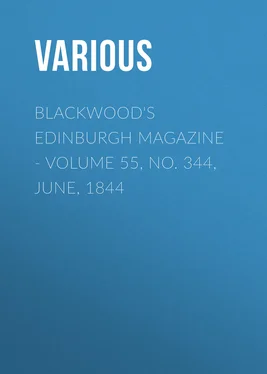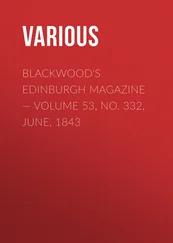Various - Blackwood's Edinburgh Magazine. Volume 55, No. 344, June, 1844
Здесь есть возможность читать онлайн «Various - Blackwood's Edinburgh Magazine. Volume 55, No. 344, June, 1844» — ознакомительный отрывок электронной книги совершенно бесплатно, а после прочтения отрывка купить полную версию. В некоторых случаях можно слушать аудио, скачать через торрент в формате fb2 и присутствует краткое содержание. Издательство: Иностранный паблик, Жанр: foreign_antique, periodic, foreign_edu, на английском языке. Описание произведения, (предисловие) а так же отзывы посетителей доступны на портале библиотеки ЛибКат.
- Название:Blackwood's Edinburgh Magazine. Volume 55, No. 344, June, 1844
- Автор:
- Издательство:Иностранный паблик
- Жанр:
- Год:неизвестен
- ISBN:нет данных
- Рейтинг книги:4 / 5. Голосов: 1
-
Избранное:Добавить в избранное
- Отзывы:
-
Ваша оценка:
- 80
- 1
- 2
- 3
- 4
- 5
Blackwood's Edinburgh Magazine. Volume 55, No. 344, June, 1844: краткое содержание, описание и аннотация
Предлагаем к чтению аннотацию, описание, краткое содержание или предисловие (зависит от того, что написал сам автор книги «Blackwood's Edinburgh Magazine. Volume 55, No. 344, June, 1844»). Если вы не нашли необходимую информацию о книге — напишите в комментариях, мы постараемся отыскать её.
Blackwood's Edinburgh Magazine. Volume 55, No. 344, June, 1844 — читать онлайн ознакомительный отрывок
Ниже представлен текст книги, разбитый по страницам. Система сохранения места последней прочитанной страницы, позволяет с удобством читать онлайн бесплатно книгу «Blackwood's Edinburgh Magazine. Volume 55, No. 344, June, 1844», без необходимости каждый раз заново искать на чём Вы остановились. Поставьте закладку, и сможете в любой момент перейти на страницу, на которой закончили чтение.
Интервал:
Закладка:
The singular superstition of spiritual favour fixing itself upon the human child, consecrated, as it were, by the hallowed light upon which the eyes first open, will shortly return upon us in The Fairies’ Sabbath .
Lo! where, from the bountiful hand of the Brothers Grimm, fall two bright dewdrop of tradition upon the pure opening flower of childhood.
“In the time of the Thirty Years’ war, there was to be seen standing not far from the town of Soest, in Westphalia, an old ruin, of which the tradition ran that there was an iron trunk there, full of money, kept by a black dog and a bewitched maiden. The grandfathers and grandmothers Who are gone, used to tell that a strange nobleman shall one day arrive in the country, deliver the maiden, and open the chest with a fiery key. They said that divers itinerant scholars and exorcists had, within the memory of man, betaken themselves thither to dig, but been in so strange sort received and dismissed, that no one since further had list to the adventure, especially after their publishing that the treasure might be lifted of none who had once taken woman’s milk. It was not long since a little girl from their village had led her few goats to feed about the very spot; one of which straying amongst the ruins, she had followed it. Within, in the castle court, was a damsel who questioned her what she did there: and when she was informed, pointing to a little basket of cherries, further said, ‘It is good; therefore take of that thou see’st before thee, with thy goat and all, and go; and come not again, neither look behind, that a harm befall thee not.’ Upon this the frightened child caught up seven cherries, and made her way in alarm out of the ruins. The cherries turned, in her hand, to money.”
“In February of the year 1605, in the reign of Henry Julius, Duke of Brunswick, at a mile’s distance from Quedlinburg, where it is called at the Dale , it happened that a poor peasant sent his daughter into the next shaw to pick up sticks for fuel. The girl took for this use a larger basket upon her head, and a smaller in her hand; and when she had filled them both and was going home, a mannikin clad all in white came towards her, and asked:—
“‘What art carrying there?’
“‘Gathered sticks,’ the girl made answer, ‘for heating and cooking.’
“‘Empty the wood out,’ said further the little manling, ‘take thy basket and follow me. I shall show thee something that is better and more profitable than thy sticks.’
“He then took her by the hand, and led her back again to a knoll, and showed her a place which might be of two ordinary tables’ breadth of a fair pure silver, being smaller and larger coins of a moderate thickness, with a image stamped like a Virgin Mary, and all round an impress of exceedingly old writing. As the silver welled up , as it were, abundantly out of the ground, the little girl was terrified and drew back, neither would she empty out the sticks from her small hand-basket. Accordingly, the little man in white himself did so, filled the basket with the money, and gave it back to the little damsel with saying, ‘That shall be better for thee than thy sticks.’ She was confounded and took it; but upon the mannikin’s requiring that she should likewise empty out her larger basket and take silver therein, she refused and said—‘That she must carry fuel home too; for there were little children at home who must have a warm room, and there must be wood ready likewise for cooking.’ This contented the manling, who said, ‘Well, then, go; take it all home,’ and thereupon disappeared.
“The girl carried the basket of silver home, and told what had happened to her. The boors now ran flocking with pickaxes and other tools, and would have their share of the treasure, but none of them was able to find the spot where the silver had welled out.
“The Prince of Brunswick had a pound of the coined silver brought him, as did moreover a burgess of Halberstadt, N. Everkan, purchase the like.”
The quick-sighted reader will not easily have missed detecting the sudden effect produced upon the two spirits by the truthful right-mindedness of the two little girls.
Correspondingly, James Grimm, from surveying collectively the Teutonic traditions of bewitched or mysteriously hidden treasure, says—
“To the lifting of the treasure is required silence and innocence . * * * Innocent children’s hands are able to lay hold upon it, as to draw the lot. * * * Who has viciously stained himself cannot approach it.” 13 13 Grimm’s German Mythology, p. 544.
Two short instances more from the copious fraternal collection, and we have done. With a temper of pure childlike antiquity, they express in the persons of the dwarfs— Teutonic approximative, fairies —the sympathy of the spirits with unstained and innocent human manners; and may, if the traditions which exhibit the fairies under a cloud of sin and sorrow should have been felt by the reader as at all grating upon his old love of them, help to soothe and reconcile him by a soft gleam of illumination, here lingering as in a newly revealed Golden Age of his own.
“In the summer, the dwarfs often came trooping from the cliffs down into the valley, and joined either with help, or as lookers-on at least, the human inhabitants at their work, especially the mowers, in hay-harvest. They, then and there, seated themselves at their ease and pleasantly, upon the long and thick arm of a maple in the embowering shade. But once there came certain evil-disposed persons, who, in the night, sawed the bough through, so that it held but weakly on to the trunk; and when the unsuspecting creatures, upon the morrow, settled themselves down upon it, the bough cracked in two, the dwarfs tumbled to the ground, were heartily laughed at, fell into violent anger, and cried aloud—
‘O, how is the heaven high and long!
And falsehood waxen on earth so strong!
Here to-day, and for ever away!’
They kept their word, and never again made their appearance in the country.”
“It was the wont of the dwarflings to seat themselves upon a great crag stone, and from thence to watch the haymakers; but a few mischievous fellows kindled a fire upon the stone, made it red-hot, and swept away embers and ashes. Morning came, and with it the tiny folk, who burned themselves pitiably. They exclaimed in high anger—
‘O wicked world! O wicked world!’
cried vengeance, and vanished for evermore!”
We have shown,—1. The Anti-christian character imputed by tradition to the fairies. 2. The occasional dependence of the more powerful spirits upon the less powerful human beings; and, 3. The strong affectionate leaning in the will of the spirits towards moral human excellence. Of the ability which, in virtue of this excellence, the human creature possesses to help , Maud must, for the present, be permitted to stand for the sole, as she is beyond all comparison our best, example.
The book of Ernst Willkomm takes a position in strong contrast to the corresponding works due to the Brothers Grimm, and other great gatherers of legendary lore. He has a personal poetic interest in the tales which they have not. He presents himself as the expositor, not only of his native superstitions, but also, zealously, of the Upper Lusatian manners. Himself cradled amongst the mountains, he has drawn with infinite pains, and by slow degrees, as he best could, from the deep interior life of the people, their jealously withheld credences, and the traditions which are sacredly associated with every nook of their craggy district.
Читать дальшеИнтервал:
Закладка:
Похожие книги на «Blackwood's Edinburgh Magazine. Volume 55, No. 344, June, 1844»
Представляем Вашему вниманию похожие книги на «Blackwood's Edinburgh Magazine. Volume 55, No. 344, June, 1844» списком для выбора. Мы отобрали схожую по названию и смыслу литературу в надежде предоставить читателям больше вариантов отыскать новые, интересные, ещё непрочитанные произведения.
Обсуждение, отзывы о книге «Blackwood's Edinburgh Magazine. Volume 55, No. 344, June, 1844» и просто собственные мнения читателей. Оставьте ваши комментарии, напишите, что Вы думаете о произведении, его смысле или главных героях. Укажите что конкретно понравилось, а что нет, и почему Вы так считаете.












